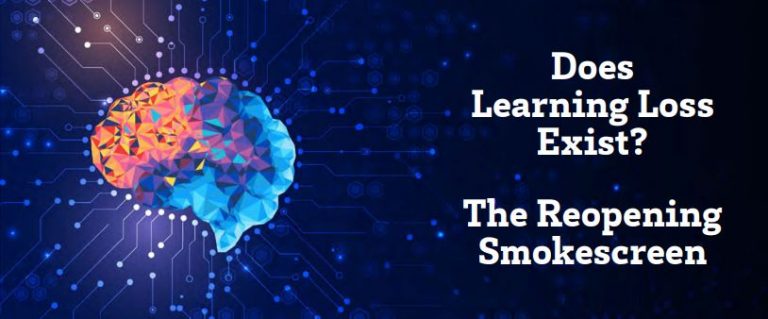By George Farmer, originally published in the June, 2021 issue of Equity & Access
It is widely understood that reopening schools is essential. It has become a talking point for government officials. The opening of schools should solely focus on safety, given the fact that schools should have been well prepared for remote learning during the 2020-2021 school year. A prominent claim amongst proponents for opening schools is the idea that students are experiencing learning loss.
The mention of learning loss, particularly during a pandemic, is displeasing to many educators as most teachers work tirelessly after hours to provide the best educational experience that rivals in-person instruction. Parents will attest that their efforts should be applauded as they assist in their child’s academic growth.
Remote learning should not be measured by “learning loss.”
The reality is the success of remote learning for many students is deduced to resources. Students who have parents who can work from home and manage their child’s learning stand a better chance to succeed.
There is no doubt about it; remote instruction is challenging for students, teachers, and parents, but the idea of losing what one has learned is the result of an outdated study. The term “learning loss” is hollow and fails to provide a sufficient explanation or solution.
Early childhood experts suggest the gaps in children’s education occur before the age of five. Educational gaps have little to do with students’ academic experiences or breaks from school during the summer months, but rather a symptom of equity. Insufficient access to educational experiences is the issue plaguing underserved communities.
Equity is a plausible explanation why “learning loss” is generally applied to black and brown students who lack resources.
The concept of learning loss stems from what is referred to as the “summer slide,” which suggests that students lose two to three months of learning during the summer months. What is not widely discussed is that the summer slide is the outgrowth of a study conducted in 1980, which revealed that more advanced students scored higher than less advanced students; however, the distances between the two groups were distorted, making the gaps appear bigger or smaller.
This distorted depiction of learning gaps enabled the scores to shrink or grow based upon the questions. Depending on the difficulty of the questions per pupil, the scores could increase or decrease, making the gaps larger. As the grades progressed, so did the learning gaps, and this concept contributed to the summer slide theory.
It is staggering how an evolving industry of education not only relies on a study from more than 30 years ago, but has expanded the basis of an outdated study and applied it to remote instruction as a means to justify the reopening of schools during a pandemic. With a year into the closing of schools, the public is made to believe remote learning has resulted in students “losing” a year’s worth of learning? If this is true, then I question the notion that students “learned” the content.
Learning loss is not an effect of Covid-19; Covid-19 has exposed practices created by standardized testing.
The mere mention of standardized testing is polarizing. Standardized testing has evolved since its inception in 1838. High-stakes testing became widely popular due to No Child Left Behind failures and expanding standardized testing as accountability measures for schools.
The 2012 reform of No Child Left Behind created the Every Student Succeeds Act. Key features of this act granted waivers and a reduction of standardized testing. While Every Student Succeed Act improves No Child Left Behind, standardized testing still exists, continuing the pressures associated with the test.
High-stakes testing pressures have shifted the landscape of education as teachers rush to keep current with pacing guides to ensure all curriculum is covered.
It is not that students lose learning; it is that students do not have the opportunity to apply what they are taught. Application breeds understanding, and understanding results in learning. We have to stop identifying students by standards that range from “does not meet expectations” to “exceeds expectations.” When we only measure students by how well we perceive they will perform on a standardized test, we reduce their ability.
Holding educators accountable for student growth is apropos, but is there a more modern approach that utilizes best practices? Particularly during a pandemic, high-stakes testing may not be the solution. Performance-based assessments may be the best option, especially during a pandemic. Using the pandemic to move away from standardized testing and toward performance based assessments is worth a try. The pandemic has altered every aspect of life; therefore, it is appropriate to adjust how we assess students.
Learning gaps exist, but they are not a residual of summer vacation or remote learning. The ramifications of remote learning are presently unknown and will be for a few years, but in the end, students are not losing what they learn. When we recognize the real problem, and there are plenty, then we will begin to create practical solutions to the real problem, which is not learning loss.
George Farmer, Ed.D., is a dedicated educator with over ten years of experience. His passion for educating students, teachers, and parents is without borders. In 2020 Dr. Farmer earned his Doctorate in Educational Leadership and Management. His research on alternatives to out-of-school suspensions contributes to education by helping to eliminate exclusionary practices.
Beginning his educational experience, Dr. Farmer served as an in-school suspension coordinator and alternative school teacher. He later spent years as a teacher before moving to an administrative role. Dr. Farmer developed a healthy school culture through supportive attendance policy, implementing a social-emotional curriculum, providing instructional coaching, and reflective practices in an administrative capacity. He is now an administrator in New Jersey. Learn more about him at farmerandthebell.com.
- George Farmerhttps://ace-ed.org/author/gfarmer/
- George Farmerhttps://ace-ed.org/author/gfarmer/





